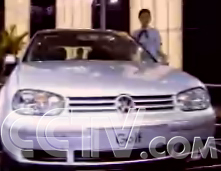 It's a moment to be remembered in China's auto industry, marking half a century of independent motor manufacturing in China. Founded in 1953, the First Automotive Works Group is the cradle of China's native auto industry. It saw the birth of the first Chinese-made sedan and truck. From a thousand Chinese cars and trucks a couple of decades ago, the group has today evolved into a conglomerate with joint ventures that have produced several million automobiles. A week-long auto fair, the third of its kind in Changchun, was held to mark the 50th birthday of China's auto industry. Nine international automobile giants including Volkswagen, Daimler Chrysler AG, Mercedes-Benz, Citroen, Toyota, Volvo and Fiat, as well as major Chinese automotive conglomerates were all in attendance at the fair, bringing with them their latest models for display. Mr. Sui Hui, General Manager of Beijing Asian Games Village Automobile Exchange has just come back from the auto fair. It's a moment to be remembered in China's auto industry, marking half a century of independent motor manufacturing in China. Founded in 1953, the First Automotive Works Group is the cradle of China's native auto industry. It saw the birth of the first Chinese-made sedan and truck. From a thousand Chinese cars and trucks a couple of decades ago, the group has today evolved into a conglomerate with joint ventures that have produced several million automobiles. A week-long auto fair, the third of its kind in Changchun, was held to mark the 50th birthday of China's auto industry. Nine international automobile giants including Volkswagen, Daimler Chrysler AG, Mercedes-Benz, Citroen, Toyota, Volvo and Fiat, as well as major Chinese automotive conglomerates were all in attendance at the fair, bringing with them their latest models for display. Mr. Sui Hui, General Manager of Beijing Asian Games Village Automobile Exchange has just come back from the auto fair.
"I was most impressed by the fact that the auto industry, including auto markets in China, has achieved enormous development in the past 50 years," said Sui Hui, general manager of Beijing Asian Games Village Automobile Exchange.
In 1953, China established the First Automotive Works in northeast city of Changchun in Jilin Province, marking the start of China's own auto industry. At the same time, Tsinghua University began to award the country's first degrees in Automobile Engineering.
"The First Automotive Works was then a typical enterprise, turning out ‘Jie fang’ motor cars and trucks. That was the starting phase of China's auto industry. The second phase lasted from the Cultural Revolution to the time before China's opening up. The Second Automotive Works and the Capital Automotive Works were established, manufacturing heavy trucks for combat readiness. The third phase came after China's opening up. This period of auto manufacturing centers on international cooperation and aims to offset the imbalance between heavy and light auto production. Passenger cars are being developed very fast. Technology transfer, especially in the production of passenger cars is the feature of the time. We set up many joint ventures and achieved good result in mass production. This is a historical leap forward," said Ouyang Minggao, dean of Dept. of Automotive Engineering of Tsinghua University.
The total output of the auto industry was only 500,000 cars in 1990. While in 2002, the figure surged to more than 3.2 million units. In the first quarter of this year, the entire industry produced over 1 million vehicles.
In 2002, the auto industry's sales revenues accounted for 5.2 percent of total industrial sales, up from 2.2 percent in 1990 and 4.4 percent in 2001. The ratio rose to 6.2 percent in the first quarter of this year.
One yuan of auto output will give rise to two yuan of output in directly-related industry such as machinery, electronics, and petrochemistry, and five yuan output in other indirect industries. In the course of becoming a global manufacturing center, the auto industry has become the driving force for China's modernized industry. The latest research from China's National Bureau of Statistics shows that auto production has become the country's fifth largest manufacturing sector. The figures suggest that China will become the fourth largest auto manufacturing country in the world in 2003 after the US, Japan and Germany.
"China's auto industry began to display strength on the international stage, drawing auto giants the world over to transfer their technologies, manufacture cars or set up joint ventures in China," said Ouyang Minggao.
The automobile sector is related to five industries. In auto manufacturing, China has turned out 4 million units this year, ranking fifth in the world.
After-sale services in auto markets are developing rapidly. Auto dealers and franchised stores have set up all over the country, offering customers convenient environments for purchasing. Local governments also laid out corresponding promotion plans.
Major cities regard cars not only as a means of transport, but as sport as well. Beijing has one or two markets specializing in auto sports activities. It shows that auto related industries are developing very fast. Next comes car culture. Customers are spending a lot on auto sound systems and car customizing. Some may spend 100,000 yuan buying a car, and more than that sum on customizing their new car. Auto information is becoming a large industry all over the country.
 Consumption became the powerhouse of production in the market situation and provided the internal drive for the industry to grow. By the end of 2002, an average of 2.8 autos were owned by every 100 families. Study of international car market demonstrates that cars become affordable to ordinary families when the average price is two to three times their annual income.
Consumption became the powerhouse of production in the market situation and provided the internal drive for the industry to grow. By the end of 2002, an average of 2.8 autos were owned by every 100 families. Study of international car market demonstrates that cars become affordable to ordinary families when the average price is two to three times their annual income.
"The ratio of private car purchasing is surging in China's auto market. Family cars are in vogue. This is also of milestone significance because the auto industry relies on the market, a mass market for growth," said Ouyang Minggao.
Auto fairs large and small become a stage for car manufacturers to promote sales and display their new models. Music, performances and beautiful girls take the limelight on these occasions. They also become for car owners, enthusiasts and potential buyers, a place to check out their favorite fashions. In ancient times most people depended on their feet to get around. Only the wealthy could afford horse-drawn carriages. Keeping stables was costly and owning a carriage therefore became a symbol of high social status. China's first passenger car was made for the nation's top leaders. Only a decade ago, the car was regarded as a luxury that no ordinary person could ever dream of. Today, the automobile has become for many Chinese families, a daily necessity.
Car sales have been brisk so far this year in China's major cities. As the dispensable income of China's urban population keeps growing, the automobile has become one of the most sought after commodities in personal consumption. For young people living in Beijing or Shanghai, owning a car is an almost essential part of their career advancement. The truth is, ordinary Chinese have already become the chief driving force in the nation's booming car market. The latest statistics show that car purchases by individuals accounted for nearly 80 percent of China's auto sales in the first quarter of this year. Vois, a Toyota model, became a best seller as soon as it rolled off the production line.
"The sales of Vios have been brisk since it rolled of the production line last October. This is true with most new models, but with Vois it's lasting longer. We received about 1000 orders in the last two months of last year," said Fan Yonggan, sales manager of Beijing Toyota (Fangzhuang) Sales & Services Center.
There are basically three ways of purchasing a car: cash, installment or credit loans. Purchasing on loans is a rather new concept for most Chinese people. According to car dealers, credit loans account for 20-30 percent of all car sales in Beijing. This is not much compared with industrialized countries. Generally, that figure is 50-80 percent in those countries. But more and more people begin to identify with this method of consumption. And when choosing their cars, price and options are the top concerns of consumers. Time-honored brands are often big sellers.
"The sunroof, electric viewfinder and locks, GPS, as well as double air bags are all included; the price is quite reasonable, so I decided to buy the car. The loan can be repaid gradually. There is not much pressure. I am ready to buy the car on credit," said Vios Consumer.
With China's economy on the fast track, an affluent middle class is taking shape and growing rapidly. They are mostly young, open-minded and confident about their future. They dare to spend, even tomorrow's money.
To many people in China, cars are still a status symbol. Owning a car not only means freedom of mobility, but also shows that you have entered the class of the nouveau riche and are keeping up with the trend.
For the majority of people in China, cars are still a luxury. But many of them are beginning to dream about owning a car. With more and cheaper cars available on the market, their dream may soon become a reality.
|